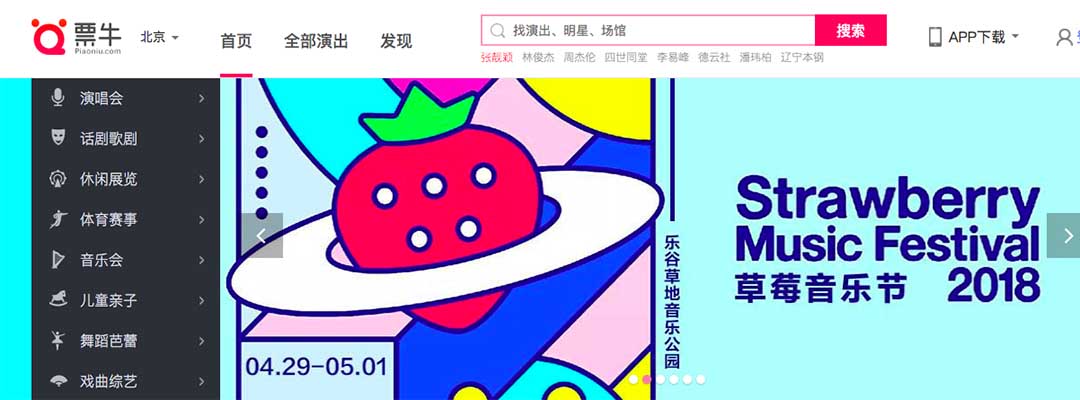Piaoniu.com(票牛网), a third party platform for ticket trading, announced that it has completed a series B funding recently with investment from SIG, Sequoia Capital, GGV Capital, and private investor ZHANG Tao, the founder of Dianping.
Piaoniu.com was launched at the end of 2015 focusing on the live entertainment industry. As its business grew, the company develops itself into a platform providing data service for this industry, while the ticketing platform became its secondary business.
SUN Liyong, the founder and CEO of piaoniu.com, said that the website has reached a monthly turnover of over 50 million yuan (approximately US$8 million) and sold out more than 100 thousand tickets in a single month with sales per customer of 700-800 yuan (approximately US$110 – 130).

In terms of supply chain, piaoniu.com has come to cooperate with some large-scale ticketing companies and hundreds of event organizers, ensuring sufficient inventory of tickets and high-quality shows. As for the customers, piaoniu.com draws support from third parties, including offline venues and event organizers as well as online platforms like JD.com and Douban.com, to increase channels for attracting potential buyers. Encouraging users to post UGC (user-generated content) after shows and calling on event organizers to push PGC (professionally-generated content), is of grave importance, so as to retain customers and increase their stickiness.
Based on statistics from SUN, the revenue of piaoniu.com in 2017 almost hit 400 million yuan (approximately US$64 million) and has millions of users. Therefore, it’s estimated that the trading volume in 2018 will be over 1 billion yuan (approximately US$159 million).
Other than ticket trading, the company has been trying to dig up opportunities in upstream markets within the industry since the end of 2016.
With an increasing number of people willing to pay for offline shows and matches, many ticketing platforms have risen in China.
Although some influential platforms in the primary market like Damai.cn and Yongle Ticketing are authorized to sell the majority of the tickets, they cannot respond timely to ticket price adjustment. This is where ticketing companies in the secondary market find their opening.
The secondary market comprises of various players, including tking.cn, a platform focusing on supplying discounted tickets, and xishiqu.com, a free trade market, reselling tickets from both business clients and consumers.
According to SUN, the ticketing industry is relatively traditional. Even though online ticket transaction has gradually become common, data like prices on different platforms in different levels of markets and circulation trajectory of each ticket have not been recorded. Non-transparent consumption data makes it impossible for event organizers and cultural product providers to predict market response and adjust ticket price.
In response to this, piaoniu.com launched a set of SaaS solutions, including e-tickets, ERP (Enterprise Resource Planning), CRM (Customer Relationship Management), and check-in machine. Dozens of venues/event organizers has adopted the solutions for data service, which are regarded as a channel for data and information between players in the upstream markets and users.
SUN spoke highly of the effects brought by positioning “data and flow” before “content preparation, production and publicity,” which he said would accelerate the reform and optimization in the live entertainment industry and introduce significant benefits to ticketing platforms.
SUN Liyong, the founder of piaoniu.com, took office in Tencent and Dianping successively, and almost all of other members of the company’s core team were once employed by Dianping, Alibaba and Tencent.
